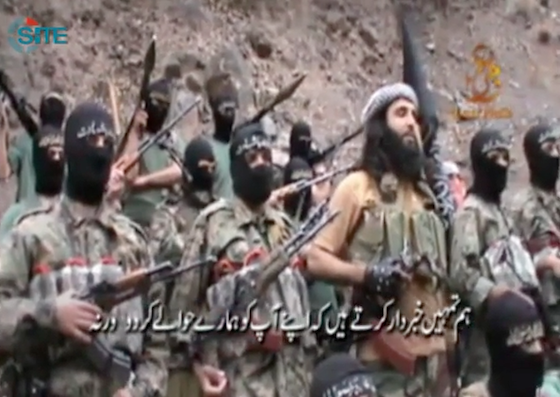
|
Adnan Rasheed (unmasked) is pictured with members of his "death squad." Image from the SITE Intelligence Group. |
The Pakistani military as well as Taliban commanders are now denying reports from two weeks ago that Adnan Rasheed, a top jihadist leader who is based in the tribal areas, was captured during a military raid in South Waziristan. Instead, an al Qaeda "trainer" is said to have been captured.
Pakistani officials claimed on July 15 that Rasheed and an al Qaeda commander known as Mufti Zubair Marwat were among those arrested in a raid in the Shakai valley in South Waziristan. Rasheed was said to have been wounded when he was captured. [See Threat Matrix report, Taliban leader Adnan Rasheed reported captured in South Waziristan.]
But now, Pakistani officials and Taliban commanders are denying the initial reports of Rasheed's capture. One Pakistani official told Reuters that "there was a mix-up." An al Qaeda explosives expert is said to have been captured in the July 10 raid, and not Rasheed.
A Taliban commander told Reuters that Rasheed "is free and safe and protected by his 12 suicide-bomber bodyguards who never leave his side. His family is with him."
It is unclear if the al Qaeda explosives expert is Marwat, who was originally identified by Dawn as "the brother of Mufti Sajjad Marwat - an al Qaeda spokesman for Afghanistan and Pakistan." Al Qaeda is known to embed military trainers and explosives experts with the Taliban and other jihadist groups in Afghanistan and Pakistan.
The Pakistani military launched an offensive in mid-June in North Waziristan to flush out the Movement of the Taliban in Pakistan as well as allied foreign jihadist groups such as the Islamic Movement of Uzbekistan and the Turkistan Islamic Party. While claiming that more than 400 jihadists have been killed, the military has not identified a single senior militant commander supposedly killed or captured during the operation.
The Pakistani military has also assured US officials that it is not discriminating in its targeting of Taliban groups. Pakistani officials have implied that the Haqqani Network and Hafiz Gul Bahadar's group are indeed a target of the operation. But no Haqqani or Bahadar commanders or fighters have been identified as being killed or captured during the North Waziristan offensive. These two Taliban groups are considered to be "good Taliban" as they do not openly advocate attacking the Pakistan state. However, the "good Taliban" shelter and support the so-called "bad Taliban" as well as groups such as al Qaeda.
Background on Adnan Rasheed
Rasheed is currently the emir of the Ansar al Aseer Khorasan ("Helpers of the Prisoners"), a group that includes members from the Islamic Movement of Uzbekistan and the Taliban and was founded to free jihadists from Pakistani prisons.
Rasheed has a long history with Pakistani terrorist groups as well as al Qaeda. He was involved in the Dec. 14, 2003 assassination attempt against then-President Pervez Musharraf. A member of the Pakistani Air Force, Rasheed was sentenced to death for his role in the assassination attempt, but the sentence was never carried out. While in prison, Rasheed owned several cell phones and frequently communicated with journalists. He also got married while in prison and fathered a child.
Rasheed worked for Amjad Farooqi, the Pakistani terrorist who engineered the two assassination attempts against Musharraf in December 2003 at the behest of al Qaeda leader Abu Faraj al Libi; Farooqi is suspected of involvement in other terror attacks as well. Farooqi was a member of the Sipah-e-Sahaba Pakistan; the Harkat-ul-Ansar and its successor, the Harkat-ul-Mujahideen; Harkat-ul-Jihad-al-Islami; and Jaish-e-Mohammed. He served as a close aide to Qari Saifullah Akhtar, the leader of the Harkat-ul-Jihad-al-Islami. In addition, Farooqi served as the group's representative to al Qaeda's International Islamic Front, which issued the 1998 fatwa that declared war on the US.
On April 15, 2012, the Movement of the Taliban in Pakistan launched a successful operation to free Rasheed and nearly 400 prisoners, including an estimated 200 Taliban fighters and jihadists, being held at a prison in Bannu. The operation was directed by Hakeemullah Mehsud, the former emir of the Movement of the Taliban in Pakistan, and Waliur Rehman Mehsud, the group's former emir for South Waziristan (both Hakeemullah and Waliur Rehman were killed by the US in drone strikes). More than 150 fighters assaulted the prison. Rasheed was later featured in a videotape celebrating the jailbreak.
Since the Bannu jailbreak, Rasheed has featured in several Taliban propaganda tapes. In January 2013, he appeared in a joint Taliban and Islamic Movement of Uzbekistan video that announced the formation of the Ansar al Aseer. The video also featured Yassin Chouka, a wanted German commander in the Islamic Movement of Uzbekistan; and Abdul Hakeem, a Russian IMU member.
In March 2013, Rasheed released a video in which he claimed to have formed an assassination squad to kill former President Musharraf. Rasheed said the "death squad" is split up in groups of "fedayeen, sniper team, special assault team, and close combat team." The term 'fedayeen' is often used to describe suicide bombers.